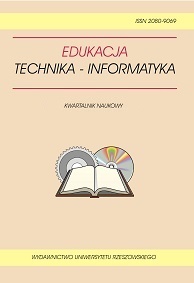Korzystanie z internetu a poziom lęku i radzenie sobie ze stresem uczniów w okresie adolescencji
Use of the Internet and the Level of Anxiety and Dealing with Stress of Students during the Adolescence Period
Author(s): Marzena Kowaluk-RomanekSubject(s): Education
Published by: Wydawnictwo Oświatowe FOSZE
Keywords: nadużywanie internetu; adolescencja; lęk-cecha; lęk-stan; dyspozycyjne i sytuacyjne sposoby radzenia sobie ze stresem; Internet abuse; adolescence; anxiety-characteristic; anxiety-state; disposition
Summary/Abstract: Dzięki urządzeniom mobilnym, „życie w sieci” stało się dla przeciętnego nastolatka jedną z głównych form strukturalizowania czasu. Oferta internetu jest niezwykle bogata, wręcz nieograniczona. Wirtualny świat otwiera przed młodym człowiekiem nowe perspektywy poznania, przyciąga kolorami, obrazami, możliwością łatwej komunikacji bez wychodzenia z domu. Wraz ze wzrostem popularności internetu rosną również obawy związane z jego nadmiernym lub niewłaściwym użytkowaniem. Zaprezentowane w niniejszym artykule badania własne dowodzą, że uczniowie nadużywający internetu mają wyższy poziom lęku-cechy i częściej doświadczają lęku- -stanu w porównaniu do swoich rówieśników. Są bardziej skłonni do spostrzegania jako zagrażających takich sytuacji, w których podlegają ocenie lub doświadczają porażki. W sytuacjach trudnych radzą sobie ze stresem, głównie koncentrując się na emocjach oraz poszukując wsparcia społecznego.Thanks to mobile devices “on-line life” has become for an average teenager one of the main forms of structuring time. The Internet's offer is very rich, simply unlimited. The virtual world opens before a young man or woman new perspectives of cognition, attracts him or her with colours, images, easiness with which he or she can communicate without leaving home. Together with increased popularity of the Internet there is increased concern about its excessive or inappropriate use. Studies presented in this article are a clear proof that students abusing the Internet have a higher level of anxiety-characteristic and more often experience an anxiety-state than their peers. They are more prone to consider situations where they are evaluated or experience a defeat as threatening. In difficult situations they deal with stress by focusing on emotions and seeking social support.
Journal: Edukacja - Technika - Informatyka
- Issue Year: IX/2018
- Issue No: 4
- Page Range: 175-181
- Page Count: 7
- Language: English, Polish

